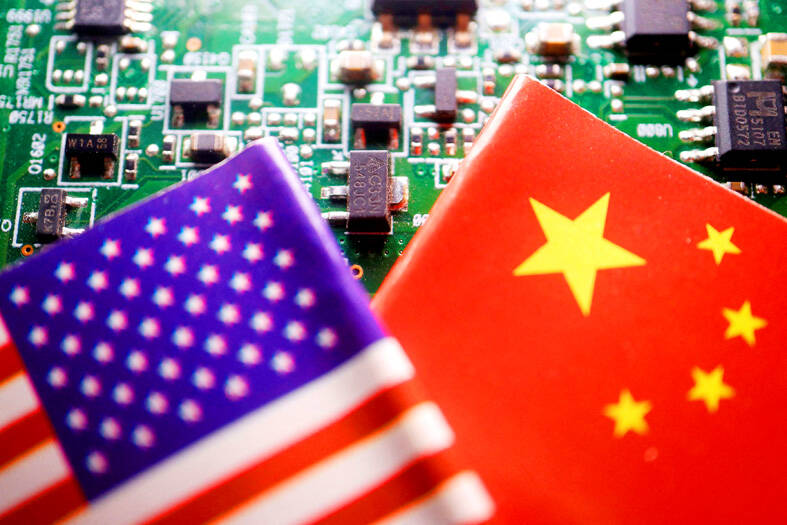US President Joe Biden’s administration is weighing sanctions on several Chinese tech companies, including memory chipmaker Changxin Xinqiao Memory Technologies Inc (CXMT, 長鑫新橋) in a fresh bid to restrain Beijing’s development of advanced semiconductors, people familiar with the matter said.
The US Department of Commerce’s Bureau of Industry and Security (BIS) is considering adding CXMT to its so-called Entity List, which restricts companies’ access to US technology, the sources said.
The BIS is also considering restricting five other Chinese firms, they said, adding that the list is not final.

Photo: Reuters
CXMT makes chips used in a wide range of products, including computer servers and smart vehicles. It competes with US-based Micron Technology Inc and South Korea’s Samsung Electronics Co and SK Hynix Inc. Micron funded an advocacy group that has long pushed for CXMT to be restricted.
The BIS and White House National Security Council declined to comment.
“We actively endorse and promote free and fair competition,” CXMT said in a statement. “Our commitment to this principle is demonstrated by our strict compliance with all relevant laws and regulations, including US export regulations.”
The company said that its chips were used in “everyday consumer products, with a specific focus on civilian and commercial applications.”
The potential sanctions are a response by the Biden administration to a chip breakthrough that Huawei Technologies Co (華為) made last year, US House of Representatives Foreign Affairs Committee Chairman Michael McCaul said in an interview last week.
The US department is weighing a sanctions package on multiple firms, McCaul said, without naming CXMT.
Huawei launched a 5G phone last year with an advanced 7-nanometer semiconductor made in China. It was lauded as a significant breakthrough considering that the administration of former US president Donald Trump cut off Huawei’s access to leading global chipmakers in 2020 over national security concerns. The handset signaled that the country’s chip industry was further along than expected.
The Biden administration has stepped up use of the department’s Entity List to keep Chinese companies from obtaining the latest US technologies. US suppliers are blocked from selling certain advanced products, equipment and components to customers on the list unless they obtain a special license from the US Department of Commerce.
Several key Chinese tech companies are already subject to those sanctions, including Shenzhen-based Huawei, its chipmaking partner Semiconductor Manufacturing International Corp (中芯國際) and lithography machine maker Shanghai Micro Electronics Equipment Group (上海微電子). In 2022, Yangtze Memory Technologies Co (長江儲存科技) was added to the list.
Beyond the blacklisting, the US is urging allies to work more closely together to contain China’s rise. The Biden administration is pressing the Netherlands, Germany, South Korea and Japan to further tighten restrictions on China’s access to semiconductor technology.

Intel Corp chief executive officer Lip-Bu Tan (陳立武) is expected to meet with Taiwanese suppliers next month in conjunction with the opening of the Computex Taipei trade show, supply chain sources said on Monday. The visit, the first for Tan to Taiwan since assuming his new post last month, would be aimed at enhancing Intel’s ties with suppliers in Taiwan as he attempts to help turn around the struggling US chipmaker, the sources said. Tan is to hold a banquet to celebrate Intel’s 40-year presence in Taiwan before Computex opens on May 20 and invite dozens of Taiwanese suppliers to exchange views

Application-specific integrated circuit designer Faraday Technology Corp (智原) yesterday said that although revenue this quarter would decline 30 percent from last quarter, it retained its full-year forecast of revenue growth of 100 percent. The company attributed the quarterly drop to a slowdown in customers’ production of chips using Faraday’s advanced packaging technology. The company is still confident about its revenue growth this year, given its strong “design-win” — or the projects it won to help customers design their chips, Faraday president Steve Wang (王國雍) told an online earnings conference. “The design-win this year is better than we expected. We believe we will win

Chizuko Kimura has become the first female sushi chef in the world to win a Michelin star, fulfilling a promise she made to her dying husband to continue his legacy. The 54-year-old Japanese chef regained the Michelin star her late husband, Shunei Kimura, won three years ago for their Sushi Shunei restaurant in Paris. For Shunei Kimura, the star was a dream come true. However, the joy was short-lived. He died from cancer just three months later in June 2022. He was 65. The following year, the restaurant in the heart of Montmartre lost its star rating. Chizuko Kimura insisted that the new star is still down

While China’s leaders use their economic and political might to fight US President Donald Trump’s trade war “to the end,” its army of social media soldiers are embarking on a more humorous campaign online. Trump’s tariff blitz has seen Washington and Beijing impose eye-watering duties on imports from the other, fanning a standoff between the economic superpowers that has sparked global recession fears and sent markets into a tailspin. Trump says his policy is a response to years of being “ripped off” by other countries and aims to bring manufacturing to the US, forcing companies to employ US workers. However, China’s online warriors